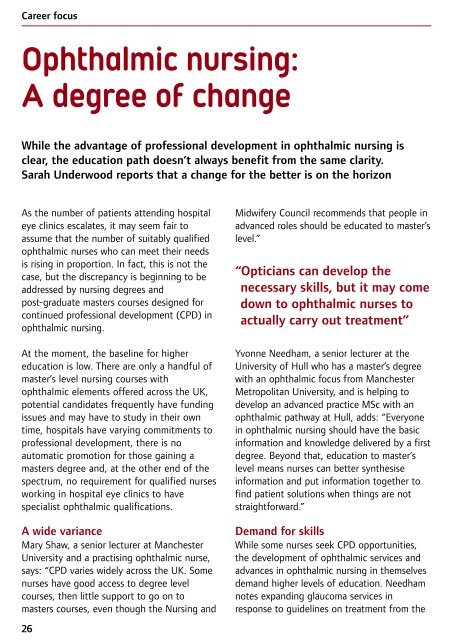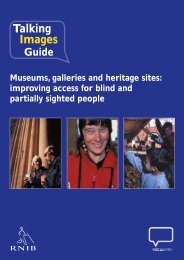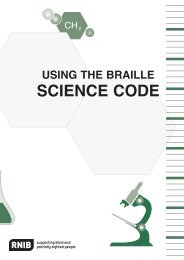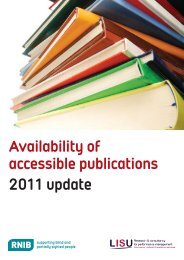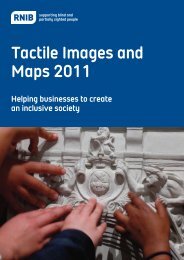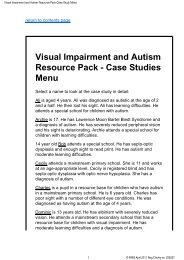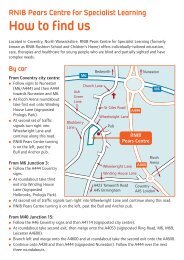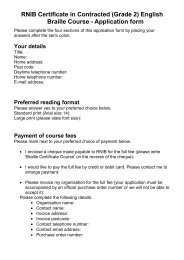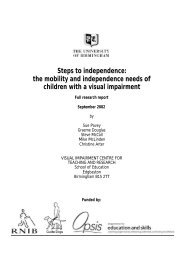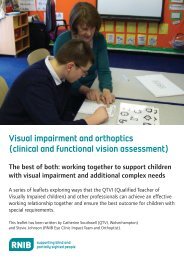Reflections on sight loss - RNIB
Reflections on sight loss - RNIB
Reflections on sight loss - RNIB
You also want an ePaper? Increase the reach of your titles
YUMPU automatically turns print PDFs into web optimized ePapers that Google loves.
Career focus<br />
Ophthalmic nursing:<br />
A degree of change<br />
While the advantage of professi<strong>on</strong>al development in ophthalmic nursing is<br />
clear, the educati<strong>on</strong> path doesn’t always benefit from the same clarity.<br />
Sarah Underwood reports that a change for the better is <strong>on</strong> the horiz<strong>on</strong><br />
As the number of patients attending hospital<br />
eye clinics escalates, it may seem fair to<br />
assume that the number of suitably qualified<br />
ophthalmic nurses who can meet their needs<br />
is rising in proporti<strong>on</strong>. In fact, this is not the<br />
case, but the discrepancy is beginning to be<br />
addressed by nursing degrees and<br />
post-graduate masters courses designed for<br />
c<strong>on</strong>tinued professi<strong>on</strong>al development (CPD) in<br />
ophthalmic nursing.<br />
At the moment, the baseline for higher<br />
educati<strong>on</strong> is low. There are <strong>on</strong>ly a handful of<br />
master’s level nursing courses with<br />
ophthalmic elements offered across the UK,<br />
potential candidates frequently have funding<br />
issues and may have to study in their own<br />
time, hospitals have varying commitments to<br />
professi<strong>on</strong>al development, there is no<br />
automatic promoti<strong>on</strong> for those gaining a<br />
masters degree and, at the other end of the<br />
spectrum, no requirement for qualified nurses<br />
working in hospital eye clinics to have<br />
specialist ophthalmic qualificati<strong>on</strong>s.<br />
A wide variance<br />
Mary Shaw, a senior lecturer at Manchester<br />
University and a practising ophthalmic nurse,<br />
says: “CPD varies widely across the UK. Some<br />
nurses have good access to degree level<br />
courses, then little support to go <strong>on</strong> to<br />
masters courses, even though the Nursing and<br />
26<br />
Midwifery Council recommends that people in<br />
advanced roles should be educated to master’s<br />
level.”<br />
“Opticians can develop the<br />
necessary skills, but it may come<br />
down to ophthalmic nurses to<br />
actually carry out treatment”<br />
Yv<strong>on</strong>ne Needham, a senior lecturer at the<br />
University of Hull who has a master’s degree<br />
with an ophthalmic focus from Manchester<br />
Metropolitan University, and is helping to<br />
develop an advanced practice MSc with an<br />
ophthalmic pathway at Hull, adds: “Every<strong>on</strong>e<br />
in ophthalmic nursing should have the basic<br />
informati<strong>on</strong> and knowledge delivered by a first<br />
degree. Bey<strong>on</strong>d that, educati<strong>on</strong> to master’s<br />
level means nurses can better synthesise<br />
informati<strong>on</strong> and put informati<strong>on</strong> together to<br />
find patient soluti<strong>on</strong>s when things are not<br />
straightforward.”<br />
Demand for skills<br />
While some nurses seek CPD opportunities,<br />
the development of ophthalmic services and<br />
advances in ophthalmic nursing in themselves<br />
demand higher levels of educati<strong>on</strong>. Needham<br />
notes expanding glaucoma services in<br />
resp<strong>on</strong>se to guidelines <strong>on</strong> treatment from the


